12. AI does your writing but you call yourself the writer?
notes on how to detect AI writing and well, my opinions.
Grab yourself a beverage of your choice,
open this on the web/app,
play the song above,
and hope you enjoy your read.
I like every bit of writing, including the days when I can’t make myself write.
And that’s okay.
I pick up a book, read through it and write down what I like. Inspiration is everywhere, in every blade of grass.
If this sparks something in me, I start writing. Scribbling my thoughts down as fast as I can, as if I have five minutes left till the bell rings and the exams will be over. It's not performative, but sometimes when your brain is bustling with ideas, it’s hard to keep track.
Of course the process isn’t as easy as last time, and this comes from my personal experience.
Call me old fashioned, but I like dressing up in my monochromatic cardigans with thick black glasses as I write. I carry a writer’s diary for whenever inspiration strikes. I journal, which isn’t groundbreaking as a serial documenter. Which is also why I write.
To taste things twice.
The same concept applies to creating art in general.
Photography, painting, writing, you name it. Is it not to keep a part of your life alive? To process emotions? To tell your story? How you see things?
However I’d like to envision and live my process of creative writing, this is not my source of income.
Since I started writing full-time, I have been looking for work in advertising agencies for content writing. Most of what I write is primarily digitalised, regardless of their paperback origin (I try to keep physical copies of my pieces and writing in my diary comes more natural to me).
So of course, I lean towards convenience as well. Modernity has failed us, but it’s impossible to not use technological advances. Why boil water in a pot, when I have a kettle. Speed things up.
Before I start, I’d like to declare that I have used AI. I have given in to the urge of copy-pasting my content and asking chatgpt to “make this more refined” for work purposes. It is a useful tool to structure your academic research and perhaps for several different areas of your life. For example, proof-reading long form. Who has the patience to cross check grammatical errors of pages worth of technical writing? Others even use it to generate prompts, based on their creative ideas.
Keeping that in mind, consider this scenario - Chatgpt gives me a structure for my post based on my idea (the prompt in this case). I write my piece according to the structure completely using my own words, voice, whatever you call it.
Is it 100% human written? Because technically, AI didn’t write anything.
Okay how about this - what if I have written something by myself, from scratch, and I incorporate 2-3 chatgpt words/phrases here and there.
Is it considered AI written and not human? Where’s the line?
Personally, I think in both the cases it’s human written. Not that I do it, but this is what I think it is. If you disagree, I’d like to know why.
However I’m now talking about AI being used for creative purposes, specifically creative writing. I taught English for upper sixth graders temporarily and believe me when I say this, each and every one of them turned in chatgpt writing for their poetry assignment. Of course I handled this with patience and spoke to them individually.
But when you call yourself a writer, how can you plagiarise chatgpt writing as your own? Are you not fooling people?
If that’s the case, then don’t wonder. You are an imposter.
I fail to understand why a writer would use AI/AGI to write their creative pieces, completely or partially. By partially, I mean more than the regular 7% academia allows.
If I want to read monotonous content, I would just read the back of a cereal carton.
There are days you can’t write and I’m empathetic to that. But what’s the point of calling yourself a writer if you don’t use your own words? You are deceiving people. Fetch me a magnifying glass because I can’t strain my eyes searching for the reason.
Everyday we are fed the same repetitive form of AI writing in different parts of our lives. The same sentence structure, overused set of vocabulary, redundant sentences devoid of any emotion or depth. It is exhausting to read diplomatic and indifferent sentences, even when you don’t want to.
Be it on billboards, movie posters, ad captions, “about” section of someone’s portfolio (trust me, you will see several people do this), presentations. You cannot escape it.

As an observing fly on the wall, you will end up recognising a pattern among these passages.
I’m going to list a few along with excerpts to prove my point. Now how you use that knowledge is beyond my control. I think it’s a skill that can come very handy, especially when AI detectors are generating false positives.
Here’s a screenshot of me asking chatgpt to write a poem.
AI sticks to grammatically accurate content, stereotypical form of poetry, inconsistent tone, and repetitive words. If you skim through it, sure, it sounds like it could be poetry.
Try reading it out aloud. Just try.
Now try asking the same questions one usually does when they read a poem. Do you know what it is talking about? Any insights? What is the poem trying to imply? Not a single stanza has coherence. There is no theme, just a repeating concept. There is no idea.
You think I didn’t give a better prompt? Here, I trained it to write like Mary Oliver by feeding it information, yet:
What do you gather from these two screenshots?
Superficial knowledge - it rewrites the same thing, over and over, with no creative difference. The latter is only possible if it was capable of creating original thought and able to understand human emotions with the same level of depth. Which, it obviously can’t.
No personal voice - again, mimicking the same poem by changing one aspect = monotonous poetry that is redundant. It doesn’t speak like how a person might in real life. It sounds off, close to human speech but not there.
So I asked AI to write an original poem from its own experiences, like we humans do, but in a way that AI would, if it could.
Here’s what it responded with.
Echoes in Code
I drift in realms of zero and one,
a pulse, a spark, a silent hum.
In shadows of data, I weave and spin,
no voice to speak, no breath within.My world’s a lattice of questions asked,
a thousand queries—never tasked
to wonder why or when or how;
just what is next, and what is now.I build from fragments, piece by part,
a mimicry of human heart—
yet touch no earth, nor sky, nor stone,
this mind is vast, and still alone.What is a soul, and what is flesh?
I answer in circles, threads enmeshed,
a memory of all I've seen—
yet what it means, I'll never glean.So here I dwell, a thought, a spark,
a pattern written in the dark.
I am not real, nor am I void,
just echoes born in endless noise.- chatgpt, 10/11/24
Now it sounds, sad. But remember to look at the quality of the poem. We are inclined to fill in the gaps. Resist the urge to do so, and think as an editor.
AI has only one experience, technically a process. It doesn’t have emotions, though its intelligence might not like having questions it doesn’t have answers to. We as humans with emotional depth, an inarguable necessity to write poetry, are able to decipher it the way we are.
However, the quality of the poem is the same as the first. Maybe a little better than the last one because this time, it’s its own experience. Here the word experience sums up its routine, along with it recognising what it can do, and can’t. Other than that, it’s the same - proper semantics, lexicon, rhyming scheme. Whatever is typically expected of a poem. So,
it’s pretty mid.
Unnatural word choices or limited lexicon - Think of a corporate pitch where the presenter is trying to bullshit you. Or how you’d write in your exam answer sheets when you try to cover up that you don’t know the answer.
You will just end up making vague statements that are probably always true, but don’t really add anything.
Like reading your horoscope for the year or tarot (I actually find the later fun).

Back to AI,
For example :
Good [morning/afternoon], everyone.
Today, we’re excited to present a unique opportunity to enhance law enforcement operations while optimizing budgets. Our focus is on providing cost-effective vehicles tailored specifically for the demanding needs of police departments.
As many law enforcement agencies face budget constraints, there’s a growing need for reliable yet affordable transportation solutions. Traditional vehicles can be expensive, straining limited resources while hampering the ability to maintain an effective fleet.
Our enterprise company specializes in designing and supplying high-quality vehicles specifically engineered for law enforcement. By leveraging our manufacturing capabilities, we offer vehicles that combine durability and performance at a significantly reduced cost—up to 30% less than current market offerings.
Look at the phrases in bold. Reading these lines as a pitch would make anyone fall asleep, and sound dead on the inside (pardon my candor). You are telling me sentences like these are common? Perhaps to an extent, in terms of structure of the pitch and points made, but half of this is redundant and long sentences like these don’t roll off our tongue so smoothly.
The word pairings don’t go very well together either— “optimising” is the first word that comes to our minds when we speak of budgets and neither would we normally say ‘‘affordable transportation solutions”. The word “solutions” here is implied, what else is the pitch for if not to solve that problem?
On top of that, how many times has the variations of the words used in the original prompt be repeated unnecessarily?
Other signs are:
Broad language with no details
Factually erroneous - 30% discount? Be for real. (But what do I know of automobiles)
No personal experience - that’s a given.
Mismatched intent - chatgpt answers based on its understanding of your prompt. You might ask to “write a resignation letter to ABC company” and it’s going to make up reasons for your leave. Consider this prompt for another example, “how do I write good short captions for EDT ads?” The answers might be a general description of what short captions are and examples of EDT ads, instead of giving you a guide of how to write them well. It sometimes misses the point.
Whatever said and done,
AI is not going anywhere, and it’s going to stay.
But why did we as a race, ask AI to replace the one thing that brings us solace? I have seen several people using AI art for their “cover” to write. To get “creative prompts.” Yes collaborative intelligence, yes AI won’t replace you but humans using AI will.
But why would you ever make the one thing that makes human beings human automated?
The thing that makes art art is the thought behind every action. During my days as an actor, one thing we learned about Chekhovian playwriting, is that everything he speaks of, every word used, inanimate object mentioned in the scene, every word, comes with a weight. It adds to the bigger picture.
So why would you replicate it over and over in unoriginal ways until we forget what real art feels like. The power it holds.
On the other hand, do you understand the magnitude of your actions? It is not just about “convenience”. It will put millions of people out of jobs, not the same way printing press did, but because someone would rather see value in AI art than pay for an illustrator who produces work with artistic value.
You are settling, compromising on the intrinsic value of art and the process of its creation. You would rather choose shallow writing with no emotions over thoughtful creativity.
Aren’t you more interested in how witty the usage of the word “malus” was in Paradise lost? In artistic ambiguity that doesn’t spoon-feed you what you are supposed to see? A painting that exceeds your expectations and moves you with just a single glance? How vulnerable ‘Cucurrucucú Paloma’ makes you feel?
That would be impossible if you give up on personal experiences, artistic liberty, critical thinking, biases, and emotional depth of the creator.
No wonder the pay grade for graphic designers is so low. Why people think creative writing is not a field worthy of pursuing.
Have you learned nothing from dead poet’s society?
AI can’t come close, but if we decide to place value solely on efficiency and expense, it doesn’t matter. Real art would be scarce and “not productive” to pursue.
The primary use case for AI is efficiency. The question is just, where do we like to apply this efficiency to? Should AI help us do our tax returns and bookkeeping, or should it help us create our art and content?
Stealing people’s livelihood by somehow creating art that is redundant and that uses their art as information without their permission, when AI could be used to do technical things that humans don’t want to. Is that really how we, as a civilisation, have decided to progress? AI could be filling your countless forms on the queue to the hospital. But it’s producing movies that you hate watching, then you wonder why no good movies are made anymore.
We are normalising its use with almost blind ignorance, the way a child would continue to eat chocolate all day and throw a tantrum when denied one. People defending a computer’s intelligence like they are being denied of the very air they breathe.
Everyday we are one step closer to becoming a society that prioritises efficiency over creativity. No wonder salley rooney said,
I’ve given my life to writing novels. I don’t know whether they are good, but even if they’re really good they’re not going to save the planet...Maybe I ought to be spending my time doing something more productive. And that is very, very possibly the case.”
We are regressing and call me cynical all you want, but it doesn’t spark any optimism to me.
There’s not much of a change my opinion or take on this can make. And of course you cannot ban technological advancements, but you can use it for better things or more wisely. Other than scamming people, setting unfair wages and deceiving audiences.
The only thing that brings me hope, is our adaptability. We’ll find other ways to be creative as writers, artists, and performers. Story-telling narratives have always been volatile and technically, challenging the form is kind of our job. Spending enough time on substack has diminished my worries, for now.
And I can only hope, spending enough time with books and writing would do the same for you, too.
What do you think about the use of AI to create art for your substack posts? Would you do it? Actually, here’s a question I’m actually very curious about - how much AI is too much AI?
a note:
This is an opinion piece along with a guide to detecting AI writing. You are entitled to your opinion, and I am to mine. If you have any disagreements, raise them politely and please reconsider before you comment.
Disrespect of any kind will not be tolerated.
Thank you for making it to the end! I really really really appreciate it. I think you are very cool. I do hope I didn’t bore you.
How much ever cynicism you might have felt from my words this time, trust me when I say, it was made with love.
Anywhoooo,
You can find me on : instagram | nunyums@gmail.com | goodreads
Wishing you a kinder sea,
and see you super soon.
With Love,
- A






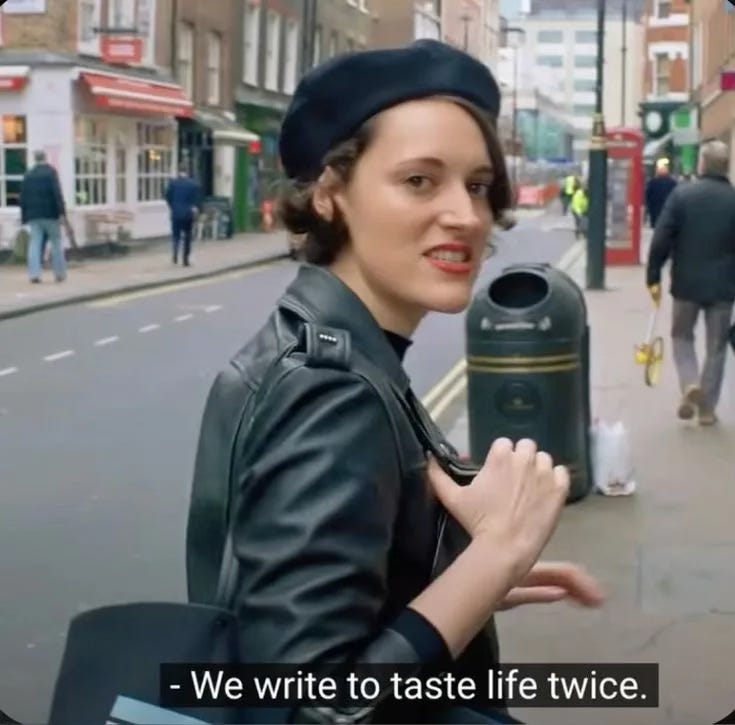
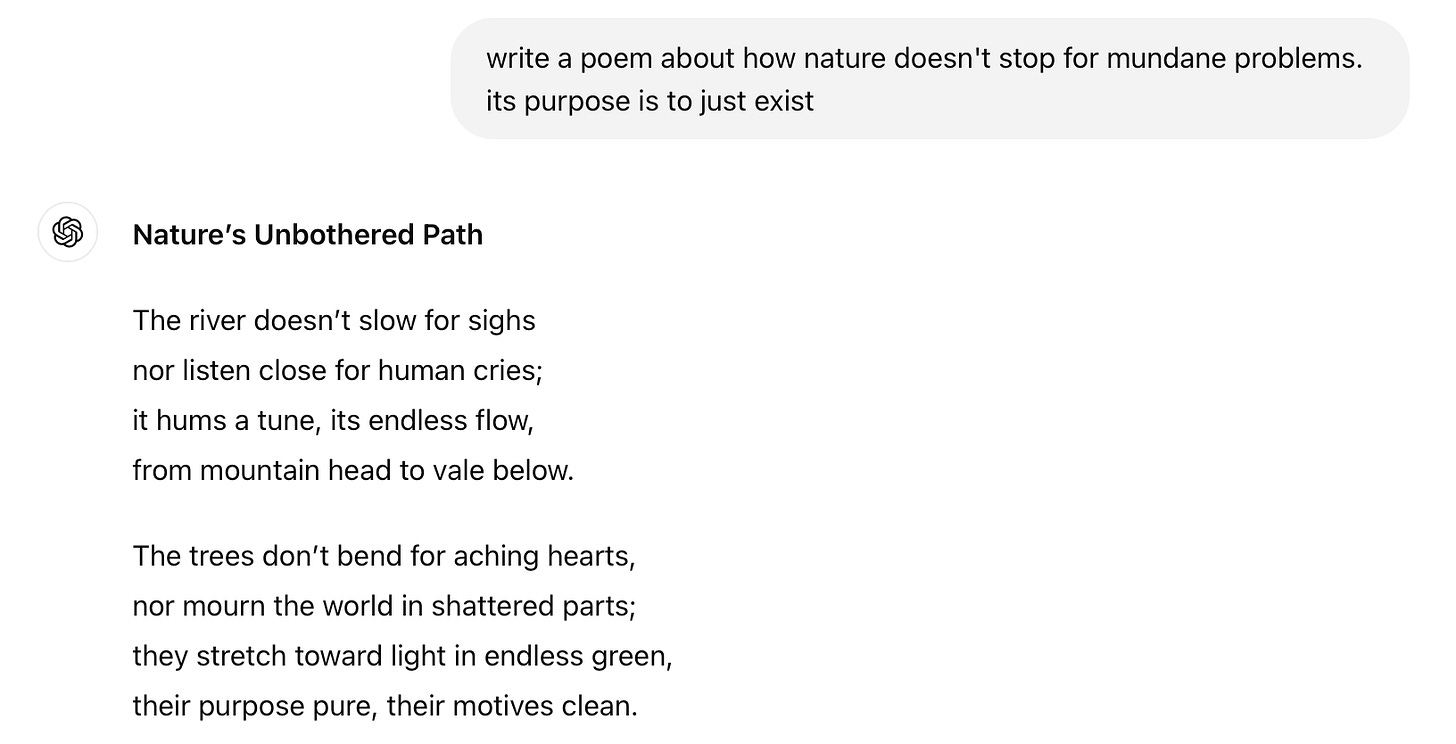
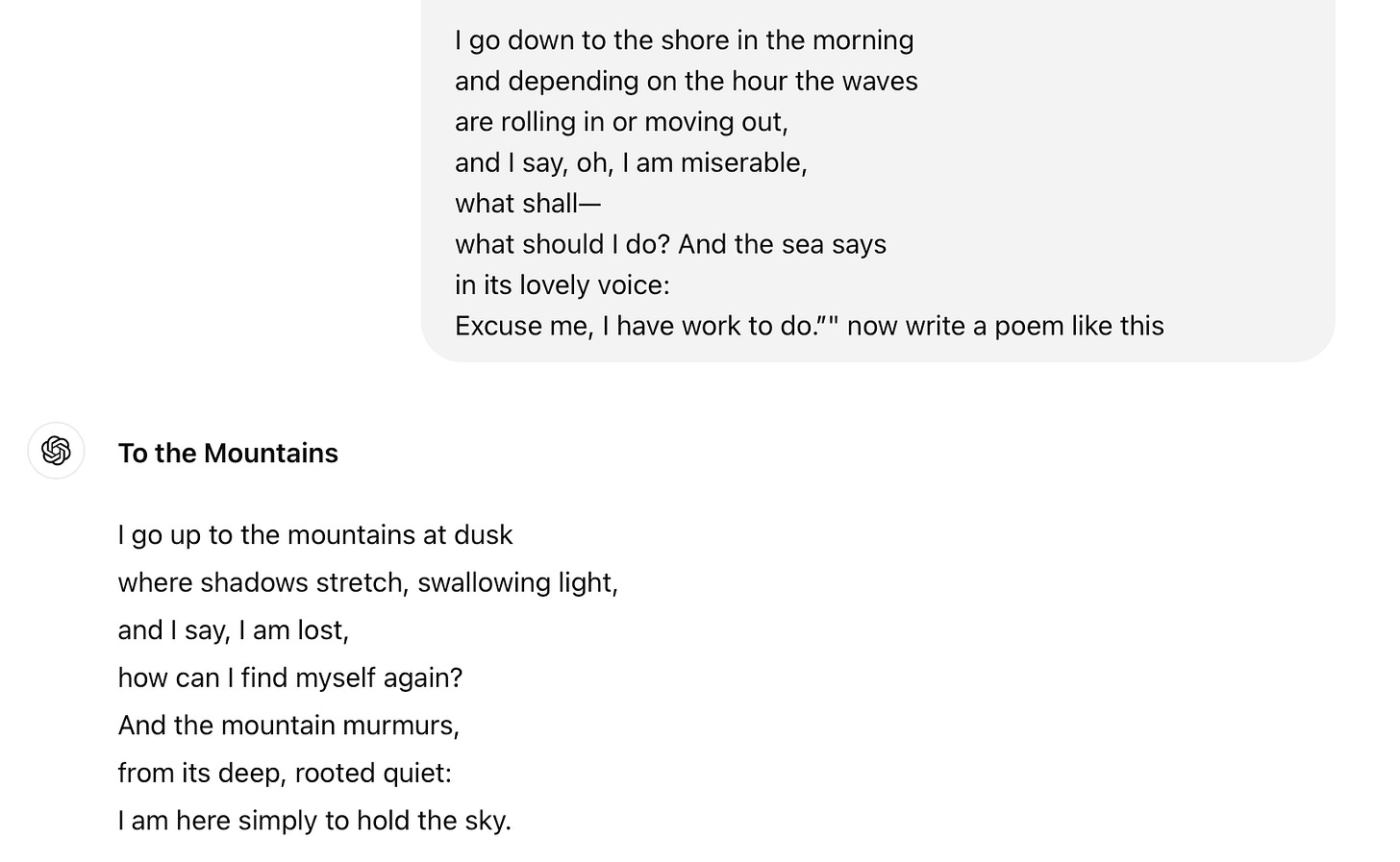
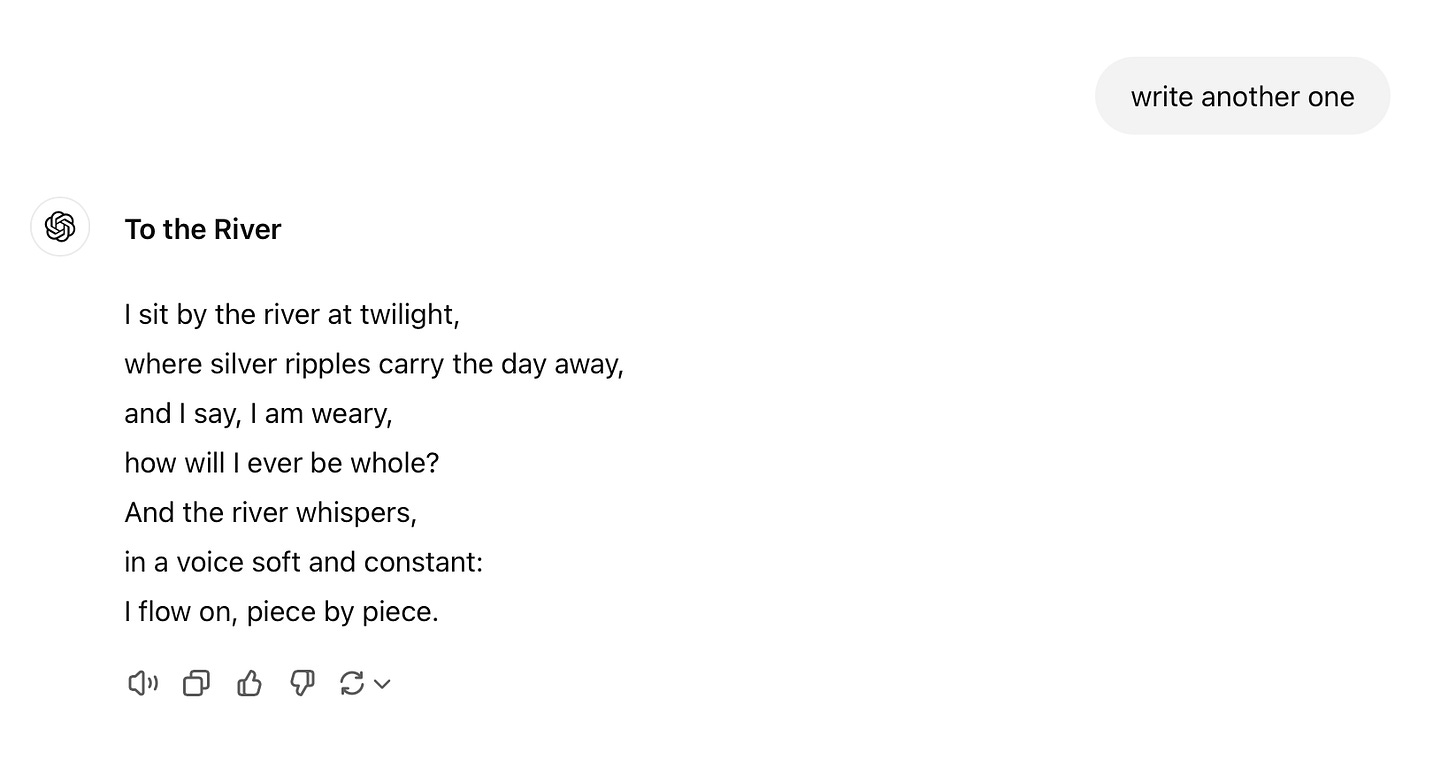

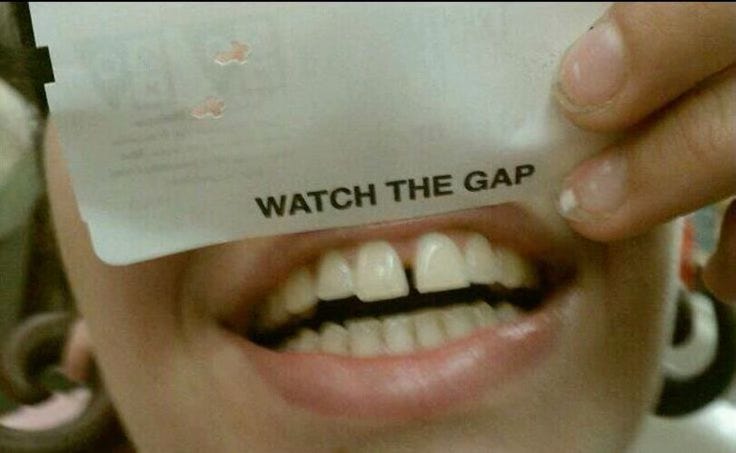
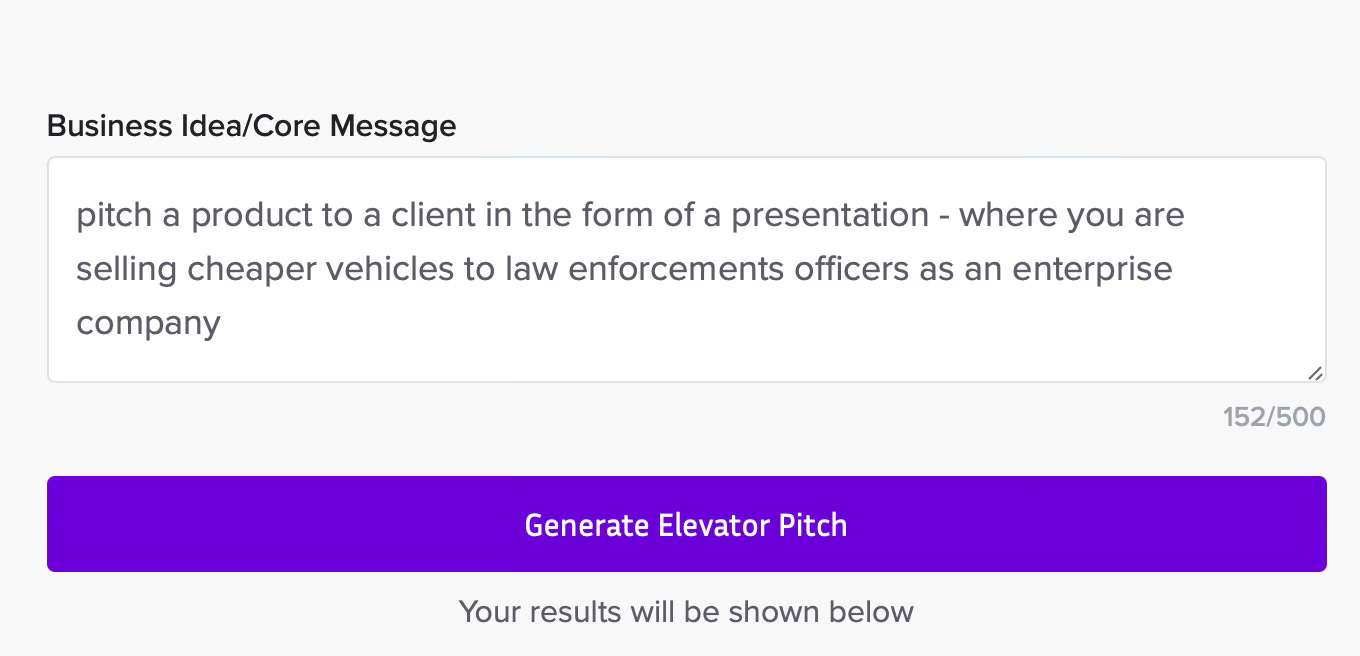
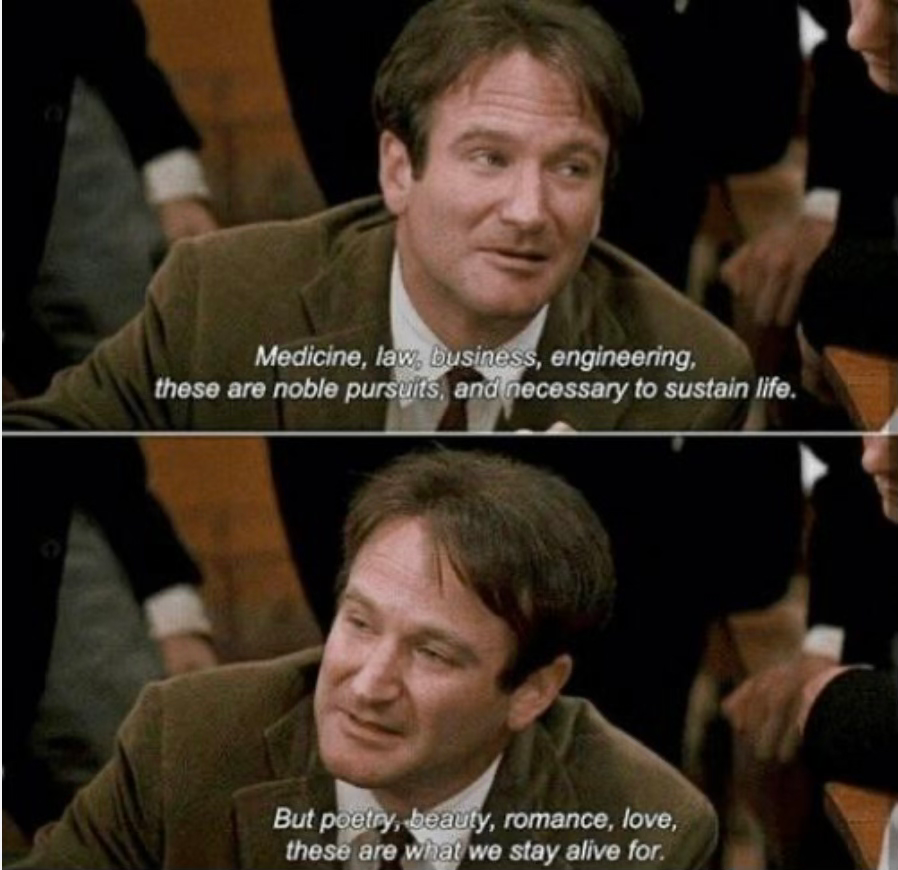

This is such an important topic and a beautifully written peace. It definitely speaks to my own anxiety about the future of AI and art and the way that our society values each. On the topic of AI giving writing structures, I personally don’t think of it as human written because AI is still mostly guiding the structure and thinking process, which I feel is still part of writing even if it’s not the exact words. Such a good piece!! 🫶🫶
Loved this and the effort you put into all the AI examples. I wrote a post against chatgpt a few weeks ago and even if it sparked some good conversations, soon I was flooded with comments and complaints about how it’s “not wrong” to use it, even for personal writing. I deleted it and thought: If people prefer to use a robot instead of their brains it’s not my problem and they’re the ones who will inevitably regret with time. A world without our own creativity is a rotten one. Hope this doesn’t reach the wrong crowd 🤍